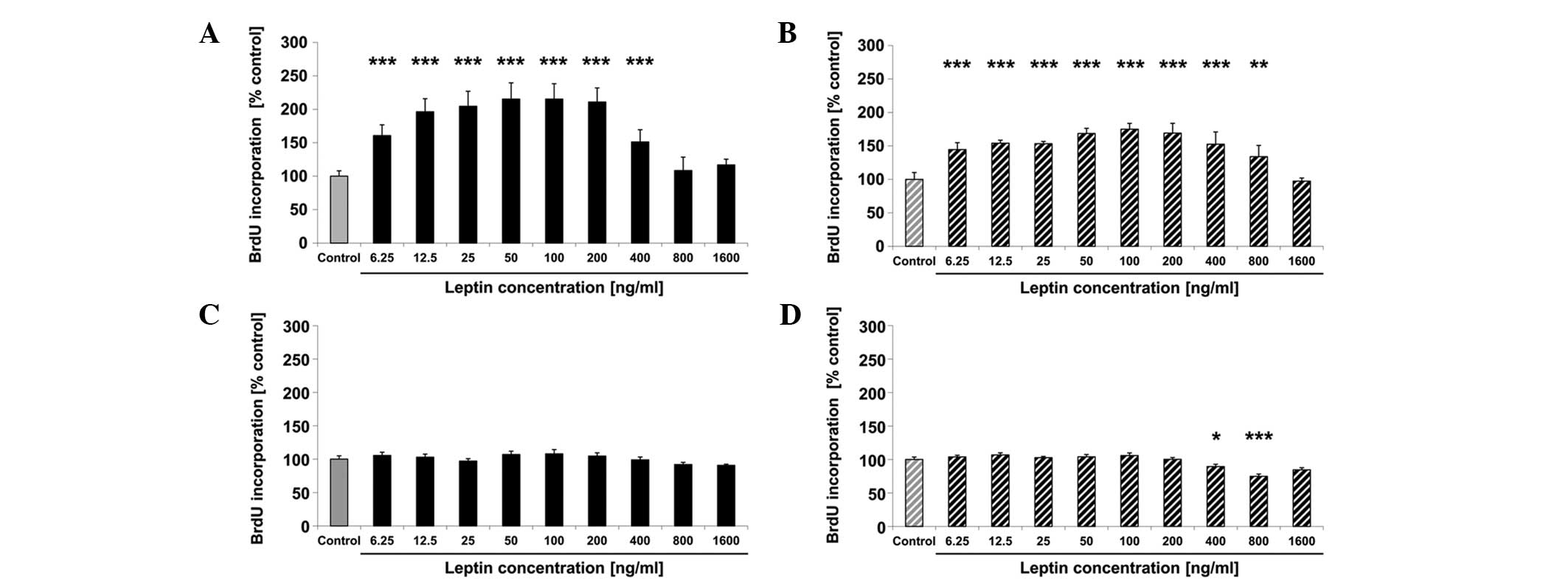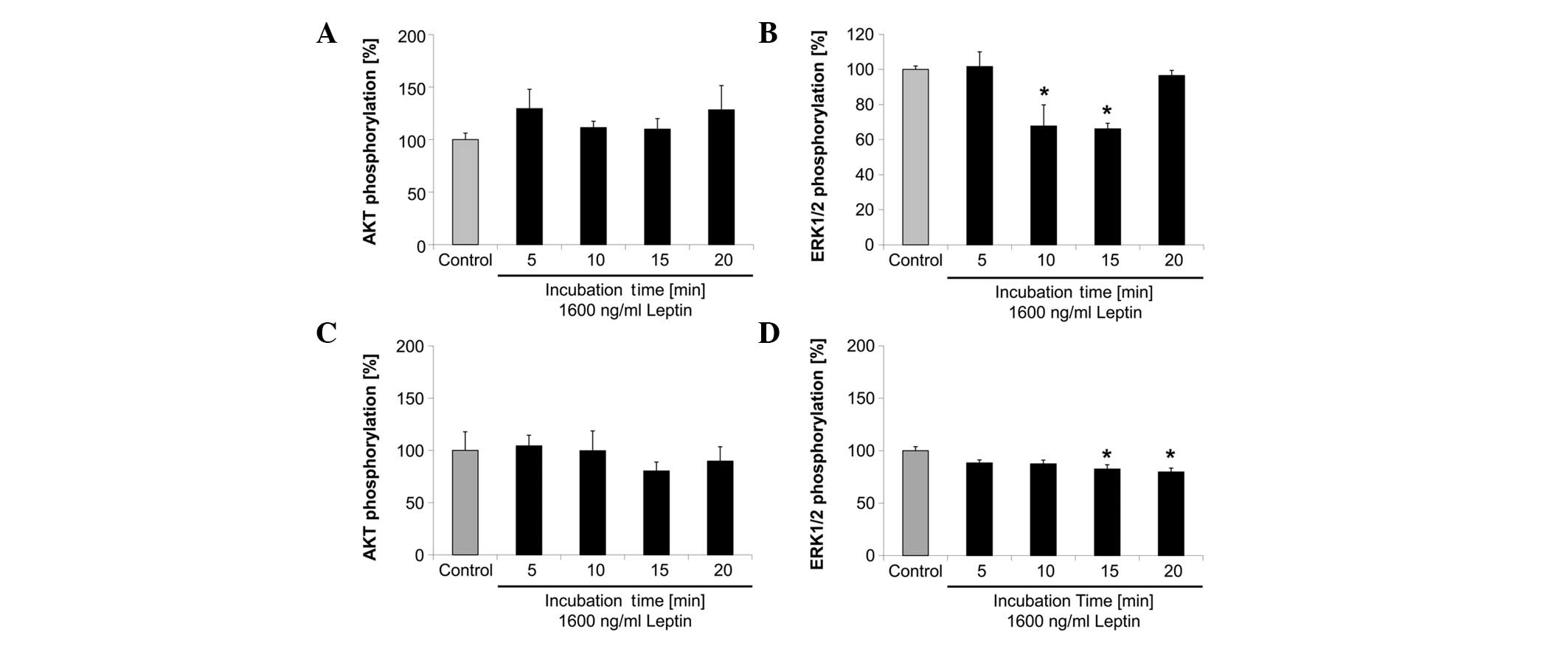|
1
|
Calle EE, Rodriguez C, Walker-Thurmond K
and Thun MJ: Overweight, obesity, and mortality from cancer in a
prospectively studied cohort of U.S. adults. N Engl J Med.
348:1625–1638. 2003.
|
|
2
|
Lorincz AM and Sukumar S: Molecular links
between obesity and breast cancer. Endocr Relat Cancer. 13:279–292.
2006.
|
|
3
|
Considine RV, Sinha MK, Heiman ML, et al:
Serum immunoreactive-leptin concentrations in normal-weight and
obese humans. N Engl J Med. 334:292–295. 1996.
|
|
4
|
Zhang Y, Proenca R, Maffei M, et al:
Positional cloning of the mouse obese gene and its human homologue.
Nature. 372:425–432. 1994.
|
|
5
|
Stephens TW, Basinski M, Bristow PK, et
al: The role of neuropeptide Y in the antiobesity action of the
obese gene product. Nature. 377:530–532. 1995.
|
|
6
|
Hu X, Juneja SC, Maihle NJ and Cleary MP:
Leptin - a growth factor in normal and malignant breast cells and
for normal mammary gland development. J Natl Cancer Inst.
94:1704–1711. 2002.
|
|
7
|
Tessitore L, Vizio B, Pesola D, et al:
Adipocyte expression and circulating levels of leptin increase in
both gynaecological and breast cancer patients. Int J Oncol.
24:1529–1535. 2004.
|
|
8
|
Révillion F, Charlier M, Lhotellier V, et
al: Messenger RNA expression of leptin and leptin receptors and
their prognostic value in 322 human primary breast cancers. Clin
Cancer Res. 12:2088–2094. 2006.
|
|
9
|
Ishikawa M, Kitayama J and Nagawa H:
Enhanced expression of leptin and leptin receptor (OB-R) in human
breast cancer. Clin Cancer Res. 10:4325–4331. 2004.
|
|
10
|
Frankenberry KA, Skinner H, Somasundar P,
McFadden DW and Vona-Davis LC: Leptin receptor expression and cell
signaling in breast cancer. Int J Oncol. 28:985–993. 2006.
|
|
11
|
Ray A, Nkhata KJ and Cleary MP: Effects of
leptin on human breast cancer cell lines in relationship to
estrogen receptor and HER2 status. Int J Oncol. 30:1499–1509.
2007.
|
|
12
|
Dieudonne MN, Machinal-Quelin F,
Serazin-Leroy V, Leneveu MC, Pecquery R and Giudicelli Y: Leptin
mediates a proliferative response in human MCF7 breast cancer
cells. Biochem Biophys Res Commun. 293:622–628. 2002.
|
|
13
|
Costantino A, Milazzo G, Giorgino F, et
al: Insulin-resistant MDA-MB231 human breast cancer cells contain a
tyrosine kinase inhibiting activity. Mol Endocrinol. 7:1667–1676.
1993.
|
|
14
|
Weichhaus M, Broom J, Wahle K and Bermano
G: A novel role for insulin resistance in the connection between
obesity and postmenopausal breast cancer. Int J Oncol. 41:745–752.
2012.
|
|
15
|
Rivas MA, Carnevale RP, Proietti CJ, et
al: TNF alpha acting on TNFR1 promotes breast cancer growth via
p42/P44 MAPK, JNK, Akt and NF-kappa B-dependent pathways. Exp Cell
Res. 314:509–529. 2008.
|
|
16
|
Weichhaus M, Broom I and Bermano G: The
molecular contribution of TNF-alpha in the link between obesity and
breast cancer. Oncol Rep. 25:477–483. 2011.
|
|
17
|
Chen C, Chang YC, Liu CL, Chang KJ and Guo
IC: Leptin-induced growth of human ZR-75-1 breast cancer cells is
associated with up-regulation of cyclin D1 and c-Myc and
down-regulation of tumor suppressor p53 and p21WAF1/CIP1. Breast
Cancer Res Treat. 98:121–132. 2006.
|
|
18
|
Laud K, Gourdou I, Pessemesse L, Peyrat JP
and Djiane J: Identification of leptin receptors in human breast
cancer: functional activity in the T47-D breast cancer cell line.
Mol Cell Endocrinol. 188:219–226. 2002.
|
|
19
|
Okumura M, Yamamoto M, Sakuma H, et al:
Leptin and high glucose stimulate cell proliferation in MCF-7 human
breast cancer cells: reciprocal involvement of PKC-alpha and PPAR
expression. Biochim Biophys Acta. 1592:107–116. 2002.
|
|
20
|
Soma D, Kitayama J, Yamashita H, et al:
Leptin augments proliferation of breast cancer cells via
transactivation of HER2. J Surg Res. 149:9–14. 2008.
|
|
21
|
Reese DM and Slamon DJ: HER-2/neu signal
transduction in human breast and ovarian cancer. Stem Cells.
15:1–8. 1997.
|
|
22
|
Naviglio S, Di Gesto D, Romano M, et al:
Leptin enhances growth inhibition by cAMP elevating agents through
apoptosis of MDA-MB-231 breast cancer cells. Cancer Biol Ther.
8:1183–1190. 2009.
|
|
23
|
Naviglio S, Di Gesto D, Illiano F, et al:
Leptin potentiates antiproliferative action of cAMP elevation via
protein kinase A down-regulation in breast cancer cells. J Cell
Physiol. 225:801–809. 2010.
|
|
24
|
Fan C, Liu X, Shen W, Deckelbaum RJ and Qi
K: The regulation of leptin, leptin receptor and
pro-opiomelanocortin expression by N-3 PUFAs in diet-induced obese
mice is not related to the methylation of their promoters. Nutr
Metab (Lond). 8:312011.
|
|
25
|
Guo S, Liu M, Wang G, et al: Oncogenic
role and therapeutic target of leptin signaling in breast cancer
and cancer stem cells. Biochim Biophys Acta. 1825:207–222.
2012.
|
















